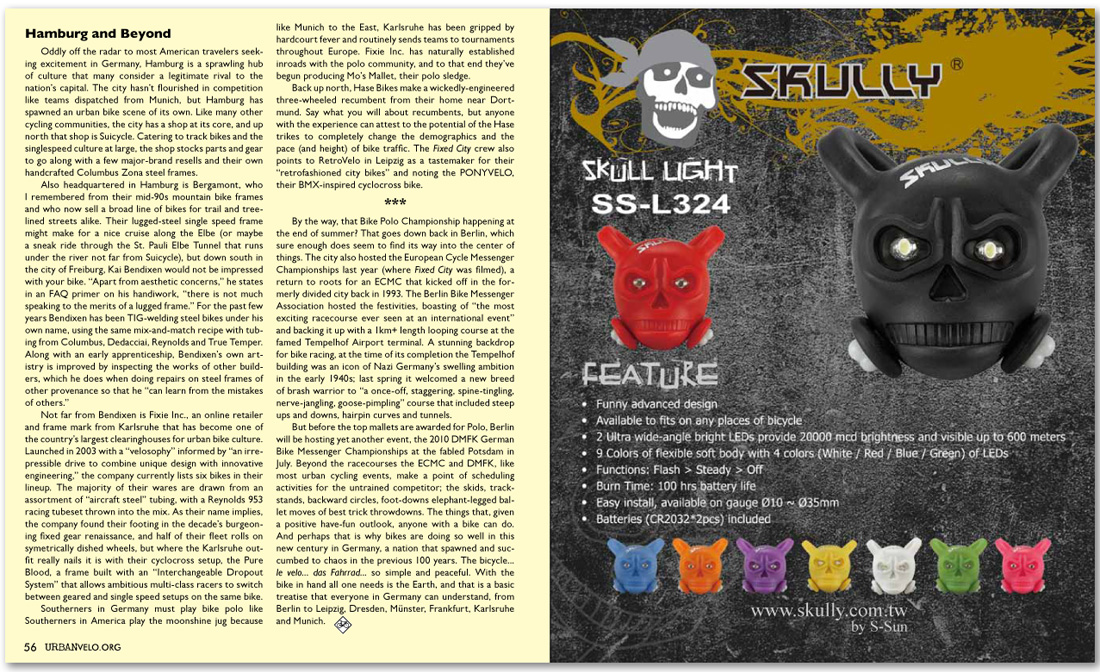


Hamburg and Beyond
Oddly off the radar to most American travelers seeking excitement in Germany, Hamburg is a sprawling hub of culture that many consider a legitimate rival to the nation’s capital. The city hasn’t flourished in competition like teams dispatched from Munich, but Hamburg has spawned an urban bike scene of its own. Like many other cycling communities, the city has a shop at its core, and up north that shop is Suicycle. Catering to track bikes and the singlespeed culture at large, the shop stocks parts and gear to go along with a few major-brand resells and their own handcrafted Columbus Zona steel frames.
Also headquartered in Hamburg is Bergamont, who I remembered from their mid-90s mountain bike frames and who now sell a broad line of bikes for trail and tree-lined streets alike. Their lugged-steel single speed frame might make for a nice cruise along the Elbe (or maybe a sneak ride through the St. Pauli Elbe Tunnel that runs under the river not far from Suicycle), but down south in the city of Freiburg, Kai Bendixen would not be impressed with your bike. “Apart from aesthetic concerns,” he states in an FAQ primer on his handiwork, “there is not much speaking to the merits of a lugged frame.” For the past few years Bendixen has been TIG-welding steel bikes under his own name, using the same mix-and-match recipe with tubing from Columbus, Dedacciai, Reynolds and True Temper. Along with an early apprenticeship, Bendixen’s own artistry is improved by inspecting the works of other builders, which he does when doing repairs on steel frames of other provenance so that he “can learn from the mistakes of others.”
Not far from Bendixen is Fixie Inc., an online retailer and frame mark from Karlsruhe that has become one of the country’s largest clearinghouses for urban bike culture. Launched in 2003 with a “velosophy” informed by “an irrepressible drive to combine unique design with innovative engineering,” the company currently lists six bikes in their lineup. The majority of their wares are drawn from an assortment of “aircraft steel” tubing, with a Reynolds 953 racing tubeset thrown into the mix. As their name implies, the company found their footing in the decade’s burgeoning fixed gear renaissance, and half of their fleet rolls on symetrically dished wheels, but where the Karlsruhe outfit really nails it is with their cyclocross setup, the Pure Blood, a frame built with an “Interchangeable Dropout System” that allows ambitious multi-class racers to switch between geared and single speed setups on the same bike.
Southerners in Germany must play bike polo like Southerners in America play the moonshine jug because like Munich to the East, Karlsruhe has been gripped by hardcourt fever and routinely sends teams to tournaments throughout Europe. Fixie Inc. has naturally established inroads with the polo community, and to that end they’ve begun producing Mo’s Mallet, their polo sledge.
Back up north, Hase Bikes make a wickedly-engineered three-wheeled recumbent from their home near Dortmund. Say what you will about recumbents, but anyone with the experience can attest to the potential of the Hase trikes to completely change the demographics and the pace (and height) of bike traffic. The Fixed City crew also points to RetroVelo in Leipzig as a tastemaker for their “retrofashioned city bikes” and noting the PONYVELO, their BMX-inspired cyclocross bike.
***
By the way, that Bike Polo Championship happening at the end of summer? That goes down back in Berlin, which sure enough does seem to find its way into the center of things. The city also hosted the European Cycle Messenger Championships last year (where Fixed City was filmed), a return to roots for an ECMC that kicked off in the formerly divided city back in 1993. The Berlin Bike Messenger Association hosted the festivities, boasting of “the most exciting racecourse ever seen at an international event” and backing it up with a 1km+ length looping course at the famed Tempelhof Airport terminal. A stunning backdrop for bike racing, at the time of its completion the Tempelhof building was an icon of Nazi Germany’s swelling ambition in the early 1940s; last spring it welcomed a new breed of brash warrior to “a once-off, staggering, spine-tingling, nerve-jangling, goose-pimpling” course that included steep ups and downs, hairpin curves and tunnels.
But before the top mallets are awarded for Polo, Berlin will be hosting yet another event, the 2010 DMFK German Bike Messenger Championships at the fabled Potsdam in July. Beyond the racecourses the ECMC and DMFK, like most urban cycling events, make a point of scheduling activities for the untrained competitor; the skids, trackstands, backward circles, foot-downs elephant-legged ballet moves of best trick throwdowns. The things that, given a positive have-fun outlook, anyone with a bike can do. And perhaps that is why bikes are doing so well in this new century in Germany, a nation that spawned and succumbed to chaos in the previous 100 years. The bicycle... le velo... das Fahrrad... so simple and peaceful. With the bike in hand all one needs is the Earth, and that is a basic treatise that everyone in Germany can understand, from Berlin to Leipzig, Dresden, Münster, Frankfurt, Karlsruhe and Munich.